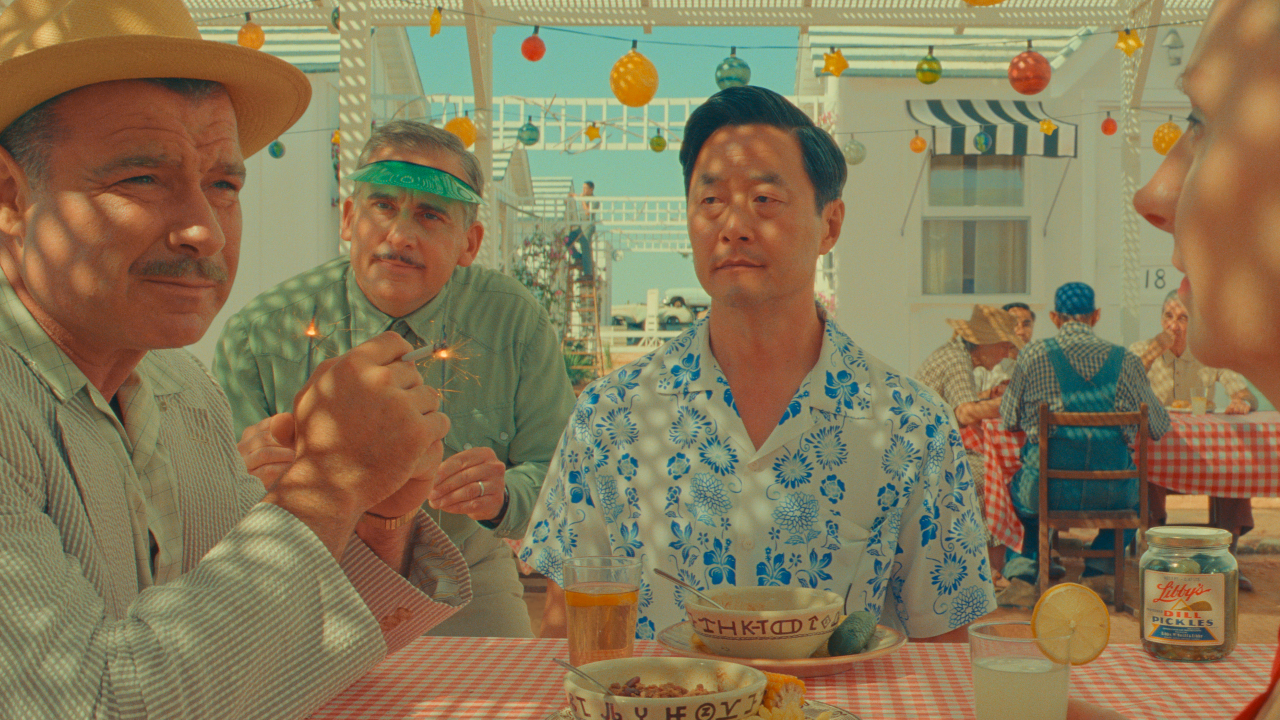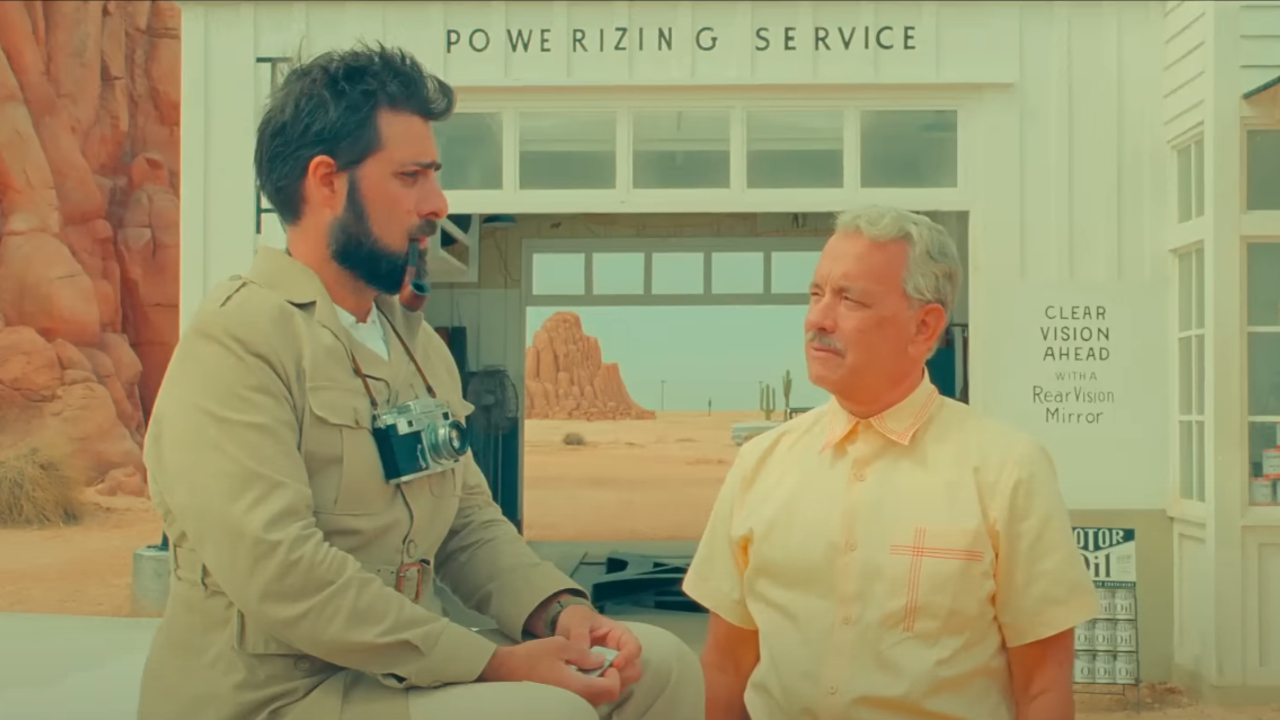
Warning: spoilers for Asteroid City are in play. If you haven’t seen this movie just yet, you’ve been warned.
“You can’t wake up if you don’t go to sleep.” It’s the line that pops up out of nowhere and stuns audiences in Wes Anderson’s new film Asteroid City, which is about to open in wide release this weekend. The 2023 new movie release is one of his most experimental, thanks in part to this philosophical broadside that plows into a movie already navigating two realms of reality. So I had to ask the cast about this baffling statement from the film, who in turn have provided some interesting interpretations of their own.
While speaking with Adrien Brody and Jeffrey Wright, Brody immediately picked up on the question at hand. Though he deferred the question to his interview partner, which allowed Wright to rope in some knowledge from a previous Wes Anderson movie. Sharing his thoughts with CinemaBlend, the actor's interpretation of this mystery is quite intriguing:
When I watched it, within the context of everything going on now, there was something about, in my head, that related to staying awake. Staying woke. Maybe that was just me imposing, but I liked it. There’s another reference, [a] similar reference in French Dispatch, ‘Nous ne sommes pas sleepy,’ we’re not sleepy. With the students. I don’t know. There’s a theme that Wes may be playing with. ‘Keep your eyes open. Watch them.’
Indeed, the ending to Asteroid City seems to be playing in the same sort of themes that The French Dispatch’s various finales all took part in. In Wright’s summation of the more recent movie’s conclusion, it would appear that Wes Anderson has played with some massively relevant social themes in his more recent films.
One could even expand that opinion to cover The Grand Budapest Hotel, and its charmingly whimsical caper set against a nation sinking under a growing tide of fascism. Just like with his previous filmography, the trailer for Asteroid City hides this greater playground of thought in the usual candy colored settings and stylistic choices the independent auteur has always used to get his message across.
Looking at Asteroid City in the context of modern day issues was the common thread that ran through the rest of the rooms I interviewed as well. When speaking with Hope Davis and Steven Park, their read on “You can’t wake up if you don’t fall asleep” tied into another key piece of dialogue delivered by Adrien Brody’s Schubert Green. Piecing together the themes of the picture a little more in their own way, here’s Davis and Park’s reactions:
Steven Park: Well it’s a little bit of a zen koan, that’s my interpretation, where you can’t quite understand it intellectually. But the idea of waking up to the present moment, waking up to wonder. I think that’s kind of what Wes is pointing to, that there is something that’s beyond what we can understand. And like what Adrien Brody’s character is saying to Jason’s character about, ’Just keep on telling the story You’re doing great. You don’t need to understand it. Just keep moving forward.’’
Hope Davis: Me too, that’s my favorite line in the movie. … I feel every day that I’m battling this wave of information and digital content. To me it’s about saying we have to put it down, and go to sleep. It’s very literal in a way, we have to find a way to get back to a more natural rhythm of actually detaching from the world. Letting your brain shut down, so you could actually be with the person that you’re facing the next day; rather than everyone kind of existing in this half kind of awake, half there/half not there. I think this is something that Wes must have a strong opinion about, because you never see him distracted. I’ve never seen him hold a phone, I don’t know if he has a phone. But I think it’s like, we’ve gotta reconnect.
Park: I think we tend to, especially because we’re all connected to social media and whatever, we tend to walk around in this trance state. And it’s kind of a call to, ‘Hey, wake up. There’s something happening in front of you right here, right now.’

Already some have picked up on the possibility that Wes Anderson took the events of the COVID-19 pandemic, as well as other current events of dismay, and expressed his own thoughts on those themes in Asteroid City. Hope Davis’ thoughts especially opened the door to a moral that encourages us to stop doom-scrolling and go back to dreaming.
It was all brought home in the final room for the day, as Maya Hawke and Rupert Friend were my final stop on this tour of talk. Returning to that question one last time, their sentiments aligned perfectly with their cast mates, while also adding a deeper context. What Hawke and Friend provided to CinemaBlend is as follows:
Maya Hawke: I think it means if you don’t take the time to rest, and to let go, you’ll never really have awareness of what’s happening in the world around you. Anyone can have a different interpretation, but awakeness in terms of like spiritual awakeness and presence in your own life; being present. And you can’t really be present if you don’t let yourself rest.
Rupert Friend: I would go a little bit more into the sort of meditation side of things. I think it’s about shedding the ego in the sense of ‘I,’ and remembering that everything is connected. And if you want to enter that dream, it is a true dream, then you drop this notion of ‘us and them.’
No matter which film of his you’re discussing, the unifying element throughout Wes Anderson’s movies is that they’re all set in a world slightly removed from ours. Whether it’s through varying layers of reality, or even in the context of aspect ratios and varying time periods, we the audience aren’t in the same world as the characters of a film like Asteroid City.
The question of whether that makes Anderson’s message easier or more difficult to access is up to interpretation. This is probably part of why the cast took part in that Wes Anderson TikTok trend, as a good way to sell a movie of such a complex tone.
“You can’t wake up if you don’t fall asleep” is one of the lines people will be dissecting for some time to come after experiencing it firsthand. If you’re ready to take this wild ride of aliens, quarantines, martini vending machines, and theater for yourself, Asteroid City is currently in theaters. Just remember, you can’t wake up if you don’t fall asleep. But if you fall asleep at the wrong time, you could miss one of the most Wes Anderson shots in the film.







